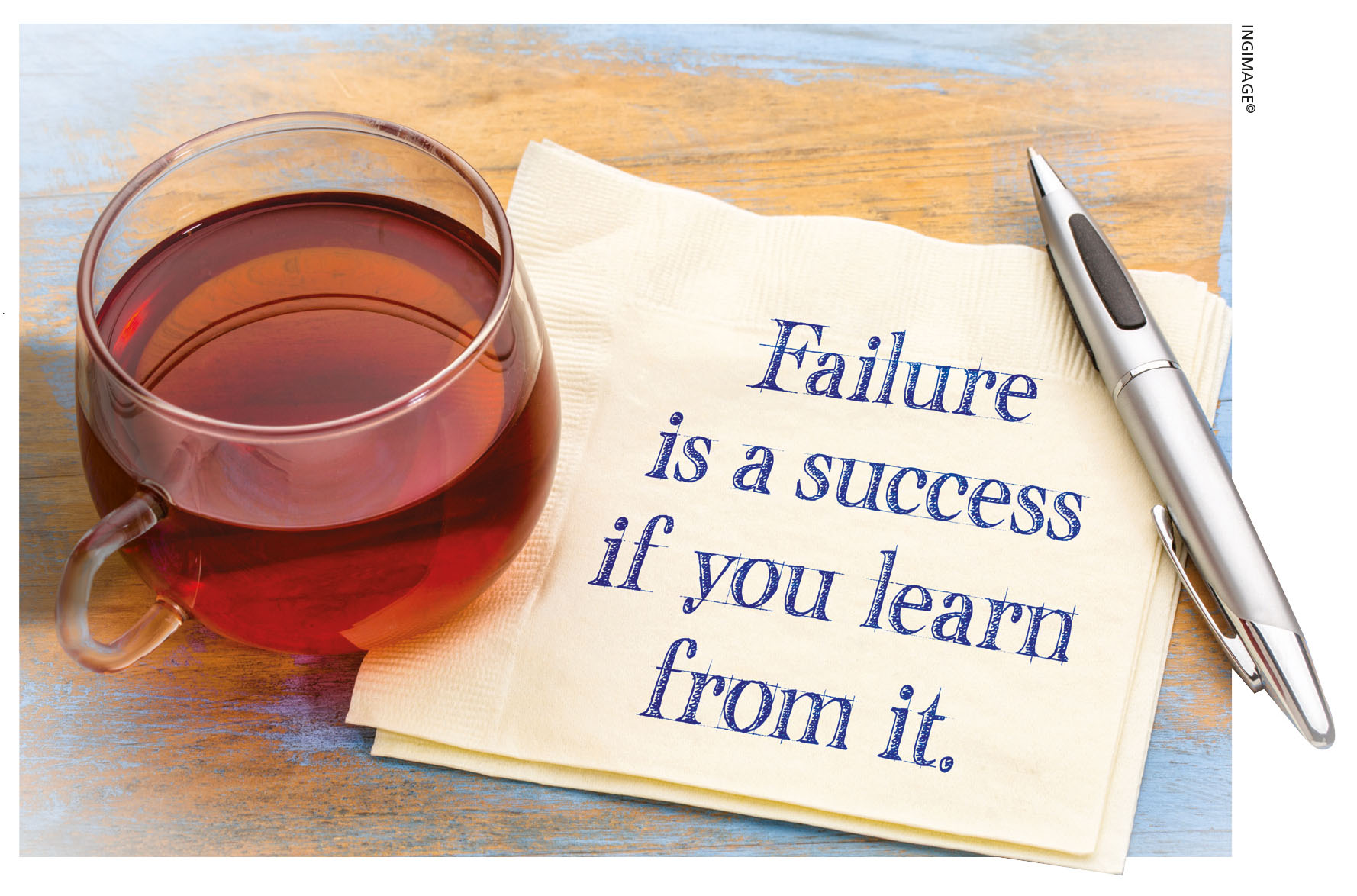PILLARS OF SUCCESS
FAILURE LEADS TO SUCCESS
Pallavi Pinakin explains why an unwillingness to fail can imprison you!
Most people view failure as being unacceptable. As youngsters, we are taught that making mistakes is a result of incompetence and laziness. So failing a test, at sports, to make friends and so on are setbacks that can cause a deep sense of shame, misery and plummeting self-esteem.
This intolerance of failure continues into adulthood and is reinforced by a work culture that values uninterrupted success (or at least, the appearance of it), and responds harshly to anything less.
An irrational fear of failure isn’t simply a quirk and it comes with serious consequences.
Firstly, mistakes are a necessary byproduct of innovation. Being creative means stepping away from how things have always been done and taking risks, which inevitably lead to some disappointments – after all, new ideas don’t come with a guarantee of success. Therefore, an unwillingness to fail imprisons you in a safe and predictable routine, from which you’re unable to break out and seize fresh opportunities.
Secondly, there’s a lack of learning. Feelings of shame may prompt you to cover up or turn
a blind eye to mistakes, which makes it impossible to learn important lessons. This holds true at both individual and organisational levels.
Take the example of the much loved animated movie WALL.E. Pixar came up with a jaw-dropping 100,000 storyboards of which 99,999 weren’t considered suitable. For the creative team at Pixar, the path to victory involved taking a number of risks, failing repeatedly and learning from every rejection.
The journey eventually led to the best possible outcome. Obviously, this process was made possible by Pixar’s leadership, which created a safe space for its team to harness the value of failure.
Employers who punish failure will see a dip in transparency and performance since employees will be reluctant to share their weaknesses or flaws openly. Instead, errors will be swept under the carpet, leading to below-par results or even (in the most extreme cases) a complete collapse.
For instance, when a company is launching a new strategy or product, it’s crucial that mistakes surface so they can be resolved. But if team members are afraid to admit failure, they’ll keep quiet and try to patch up the leaks secretly, which could seriously undermine the outcome.
At a personal level, a fear of failure can cause you to act self-destructively and even sabotage your own success. For example, if you don’t prepare properly for a presentation, you can tell yourself that ‘if I had put in the work, I’d have done a great job!’ instead of putting yourself to the test…
Not having the proper tools to cope with failure can also make you highly self-critical and obsessive, replaying any mistakes endlessly in your mind. This makes it tough to move forward and succeed – because the more you blame yourself, the worse you’re likely to perform in the future.
It’s important to see setbacks in the right perspective so that you can switch gears, and shift into the modes of learning and seeking solutions.
You can transform your approach to failure by changing your self-talk, which is the little voice in your head that says: ‘You simply can’t fail!’ Or: ‘How could you mess up like that?’
Give that voice some perspective and kindness, and allow yourself to become comfortable with making occasional mistakes. Instead of dwelling on the actual incident, look at it from a different perspective and ask yourself: ‘What did I learn from this? What could I have done differently? If a similar situation comes up again, how will I handle it?’
Another strategy is to intentionally start taking small risks to build your tolerance to failure. Experiment with a different presentation style or try to strike up a conversation with an unknown coworker. Even if you don’t succeed, the embarrassment you face will be manageable and that will help you build your resistance.
Leaders must start encouraging ‘good failure’ in their teams – the kind of setbacks that occur when you are striving to be innovative and competitive. Remember that failure isn’t the end; it’s only a pit stop along the way. In fact, if you pay attention to the signs, you may find yourself on an even better path.
As J. K. Rowling remarked in her commencement address at Harvard University: “I had failed on an epic scale. An exceptionally short-lived marriage had imploded and I was jobless, a lone parent and as poor as it’s possible to be in modern Britain without being homeless.”
“Rock bottom became the solid foundation on which I built my life. It’s impossible to live without failing at something unless you live so cautiously that you might as well have not lived at all, in which case you’ve failed by default,” she added.
And as the saying goes, ‘failures are the pillars of success.’




